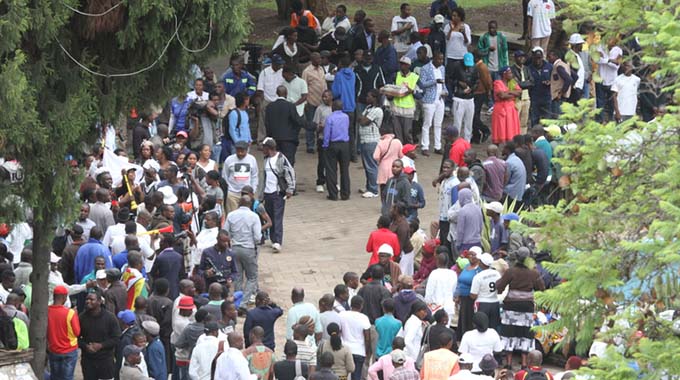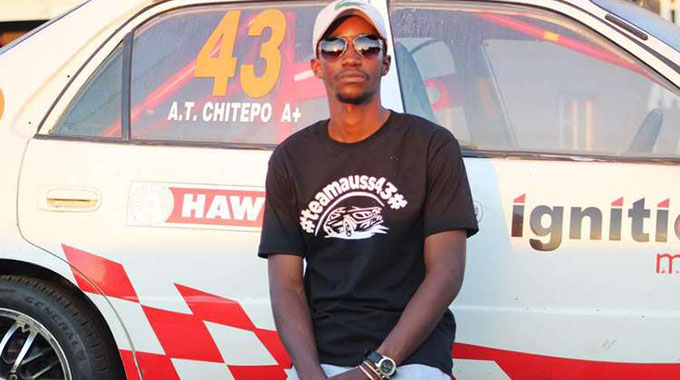What next for Nelson Chamisa?

Tichaona Zindoga Political Editor
On Thursday, Nelson Chamisa led Zimbabwe’s opposition MDC-Alliance in a demonstration in central Harare.
The demonstration, ostensibly protesting the current economic environment, was billed to be the mother of all demonstrations, coming on the back of a build up of many weeks.
When Chamisa last week appeared before the commission investigating the August 1 post-election violence, he even raised the stakes, making an ambush advertising of the event as he gave his testimony before the panel known as the Motlanthe Commission.
Chamisa has also been on a countrywide tour on rallies, albeit under a different signature.
The countrywide tours have been dubbed “Thank You” rallies, supposedly to express gratitude to the people that voted him in the July 30 elections.
Harare was supposed to be a huge political theatre on Thursday.
However, objective facts on the ground suggest that Thursday’s rally was nowhere near earth-shattering or a shutdown that was advertised on the bill.
A fair assessment would put the attendance slightly below 2 000, a number that the party has previously surpassed in bigger rallies in other times and places.
The crowd did not fill Africa Unity Square, with the rather sparse crowd occupying the north east corner of the park overlooking Parliament of Zimbabwe.
The weather in Harare was austere, but not inclement, threatening to wash away the rally in the morning.
By mid-morning the threat had dissipated and people gathered at the main venue, the Africa Unity Square, kicking off proceedings, amid chants, song and dance.
This time around, a song by a “Zim dancehall” musician that talks about “pouring sand” in people’s meals was the soundtrack: the young artiste released the dirge just in time for the rally, amid the opposition’s claim that they are able to sabotage the economy.
The MDC-Alliance hopes that an economy that does not do well will force the ruling Zanu-PF to negotiate a power sharing agreement.
The opposition has long touted itself to be in possession of some imagined keys to turn the economy — even when they have not shown credible alternatives to Government blueprints and plans.
And when Chamisa addressed the crowd, he did not have any surprises.
“The petition that we have presented contains various issues and acknowledges that there is a crisis of governance and leadership and also proffers solutions,” he said.
“One of the solutions is that we should sit down for negotiations so that we come together as leaders to solve the country’s problems and move forward.
“We should sit down to see who occupies which position, working hand in hand and move forward.”
That was pretty much what the day was worth!
Where to from here?
Thursday’s event took place without incident. Previous MDC demos have been characterised by violence and looting, to the accompaniment of the political message.
But this time around, the party’s commissars urged restraint as the crowd staged the show.
A distinctive feature was that the participants were not wearing the trademark red T-shirts, something that can be read as a strategy to not only disguise potential trouble protestors, but also communicate the misleading notion that this was not a party event, but a national rally drawing people from all walks of life.
The mission was not exactly accomplished: the optics and the mood let Chamisa down.
He failed to shut down Harare. The city was not even at a standstill as people got about their business undisturbed.
His supporters largely wore uninspired faces as they went back to different parts where they came from.
There had not been a sign from Heaven on the day. The rains came a couple of hours later, washing off their tracks.
The question is, what next for Chamisa?
Thursday was supposed to be his tour de force, but outside any incident, Chamisa can simply be ignored by those he had wanted to impress — or even intimidate — by pulling a crowd in Harare.
If the Government of President Mnangagwa, and the ruling Zanu-PF choose to ignore Chamisa and keep their eye on reforms and mending the economy, the opposition will continue barking from the sidelines.
Chamisa has been trying to achieve through demos and political grandstanding what he failed to attain in July through elections.
This strategy has its limitations.
Thursday marked a point where it will start making ever diminishing returns.
There are enough signs of desperation on Chamisa’s side: he has been hoping for an economic meltdown and a precipitation of national anger to strengthen his political hand.
A new nomenclature of “transitional authority”, deriving coinage from Tendai Biti and Ibbo Mandaza, has entered his lexicon as he seeks to build a case for inclusive, consociational politics.
(But the idea of a transitional authority — whatever it is — is baffling itself. Taken literally, what transition? Zimbabwe is already in the Second Republic after the elections of July 30, which conferred legitimacy on President Mnangagwa who had prior to that, served out the term of his predecessor, Robert Mugabe, who left office at the instance of Operation Restore Legacy last November.
Meanwhile, Zimbabwe will likely hold on and weather the storm as economic measures begin to take effect.
If the country goes beyond the hillock of the festive season and a (likely) difficult January, the opposition will be irrelevant not least because the election year will be fully behind.
Such a resolution to the story will make Chamisa irrelevant and powerless.
Chamisa is out of Parliament while his party lieutenants have seats there.
He has been bargaining for a strong political role that strengthens his political office. He has to get it now, or his political life becomes untenable.
An attendant problem regards the keenness of internal party rivals such as Elias Mudzuri and Douglas Mwonzora to challenge him for the leadership of the opposition outfit.
When all is said and done, Chamisa’s political currency is in great danger now, and it is something that he is probably feeling this morning.
There is, but one last option.
Government has indicated that it is about to make a provision for the Office of the Opposition Leader in Parliament.
This will entail the recognition of the president of the biggest opposition party in the country, coming as it will do with significant perks and authority which Chamisa could find useful in the next few years.
After all, the euphoria of elections would have worn off and the economy conceivably out of the woods.









Comments